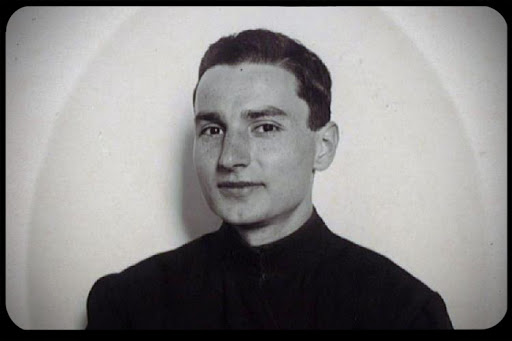ROME — Seventy one years have passed, but 80 year-old Graziano Sonnino has never doubted that he owes his life, and a great part of his education, to Fr. Raphael de Ghantuz Cubbe, a Jesuit priest of Maronite origin who hid him in Villa Mondragone boarding school outside Rome, and saved him from the horrors of the Holocaust.
In 1943, during the Nazi occupation of Italy, Villa Mondragone, located 20 kilometers from Rome in Frascati, was a school run by the Jesuits. Two Jewish families turned to the headmaster, Jesuit priest Raphael de Ghantuz Cubbe, to ask him to hide three of their children among the students: Graziano Sonnino and his brother Mario (ages 9 and 11), and his cousin Marco Pavoncello (also age 9).
Graziano told their story at Villa Mondragone, now the headquarters to Rome’s Tor Vergata University, during an April 15th ceremony sponsored by the Raoul Wallenberg Foundation, which has designated the Villa as a “House of Life.”
Shortly before the deportation of the Roman Jews on October 16, 1943, Graziano’s parents took refuge near Frascati for fear of the bombings. This saved their lives. Graziano’s aunt — his father’s sister — remained in Rome and was deported with her three children. There's been no word from them since.
Graziano’s father managed to contact the director of the Jesuit boarding school, Fr. Cubbe, to ask him to take in his two sons. The priest suggested that the family conceal their identity to protect the boys. They changed their last name ‘Sonnino’ — a name common to many Jewish families — to the more common Italian name, ‘Sbardella’. The priest decided not to reveal the boys’ true identity either to the students or professors, in order to prevent the Germans from discovering it through interrogation.
Recalling his life in the boarding school, Graziano confessed: “Our circumcision presented an ordeal for us: we couldn’t let our friends or the other boys see that we were circumcised. We always, always, always hid our religious identity.”
The boys were also nearly discovered by adhering to Jewish dietary laws. “Once at lunch they gave us prosciutto. All the boys — there were 200 of us in all — were celebrating over the prosciutto. As we had left the prosciutto on our plates, one of boys said to us: ‘Why aren’t you eating the prosciutto? What are you, Jewish?’”
“I will remember that moment forever,” Graziano said. “I took the prosciutto and put it in my mouth pretending to eat it, and I said: ‘What are you talking about, what are you, stupid? I eat prosciutto.’ And I put it in my mouth.”
“I was chewing and chewing and chewing, but I couldn’t swallow it. At that very moment, artillery fire and bombing broke out in Rome between German and American planes. All the boys went on the terrace to see the planes, and so I took the mouthful of ham and threw it away in the bathroom without being seen. The episode ended there, but we were terrified of being discovered.”
Graziano knows that Fr. Cubbe put risked his own life to to save them. “We learned afterward,” he said ,“that if they had known we were hidden there, he would have been killed.”
The rest of Graziano’s family was also saved by the Catholic Church, Graziano testified. “My father and my mother, with my little newborn brother Sergio, managed to get into St. Peter’s Basilica. They hid them there, and they remained there until the liberation. As regards my other siblings, two boys were taken in by priests and two girls were taken in by nuns.”
At the ceremony declaring Villa Mondragone a “House of Life”, the Rector of Rome’s Tor Vergata University, Prof. Giuseppe Novelli, expressed the institution’s commitment to promoting among its students the spirit of solidarity to which Fr. Cubbe bore witness. In the face of a tragedy like the Holocaust, Novelli said, “silence is an accomplice.”
In 2010, Yad Vashem recognized Fr. Raphael de Ghantuz Cubbe as “Righteous Among the Nations.”
The ceremony in Rome was also attended by two of the priest’s nephews, Francesco and Riccardo de Ghantuz Cubbe. Riccardo explained that their family traces its origins to the great Syrian city of Aleppo, a meeting place for Muslims, Jews and Christians. This, he said, allowed the Maronite Jesuit to understand the importance of the inter-religious dialogue.
The bishop of the diocese of Frascati, His Excellency Raffaello Martinelli — one of the main contributors to the Catechism of the Catholic Church — spoke of the extraordinary progress has been made in Catholic-Jewish relations since the Second Vatican Council.
Meanwhile, Riccardo Pacifici, President of the Jewish Community of Rome, praised the mission and work of the Wallenberg Foundation and promised the Roman Community’s collaboration in identifying other “Houses of Life.”
“Given what is happening in the world today, initiatives like this one are more necessary than ever,” said Novelli, recalling in particular the recent killing of 147 Christians at the University of Garissa in Kenya.
Translation from the Italian by Diane Montagna of Aleteia’s English edition.

